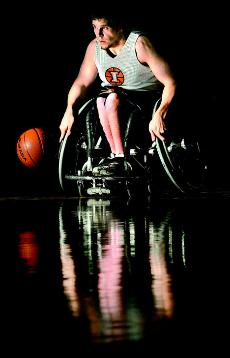‘There’s not really anything I can’t do’
April 26, 2006
Every morning, Denny Lee Muha, senior captain of the Illinois Men’s Wheelchair Basketball Team, wakes up at 5:45 a.m. to arrive at practice on time.
After practice, he either has class or work, then lifting and finally he goes home to spend time with his girlfriend and study.
Denny’s girlfriend, Amanda McGrory, is a member of the women’s wheelchair basketball team and sophomore in LAS. They go to practice together every morning and have been dating for more than a year and a half. Because Denny and Amanda are both in wheelchairs “it’s easier to deal with any disability related issues” Denny said. “I think it’s easier because there’s less to explain.”
Denny and Amanda also work together at the Rehab Center in the text conversion department. They convert texts into PDFs and books on tape for disabled students to use. And his work schedule is flexible, too.
“My boss is awesome about giving me time off for tournaments or extra practices,” Denny said. “Any other job, I wouldn’t be able to just get time off when I need it. They’re pretty strict about that. But she knows I’m an athlete and she knows my coach.”
Get The Daily Illini in your inbox!
After work, Denny lifts weights for his daily workout at the Rehab Center. He finishes his day off with more classes and time with Amanda.
Denny has been playing with the team since his freshman year when he was a Parkland Community College student.
In his sophomore year, he transferred to the University and played with the team as a starter almost immediately.
“I first came here at Parkland. I got to practice with the team but I didn’t get to play in any games . and that was the most frustrating thing ever, just because I do all that work to practice and I don’t even get to have any of the reward of playing.” Denny said. “That’s the reward of practicing hard: to use what you practice in a game. And so I’d just have to sit on the sidelines and watch and cheer and it was so frustrating. But I kept working hard, and once I transferred in I was pretty much a starter after the second tournament just because I was really familiar with everything (Coach Mike Frogley) does and I knew the players.”
And Frog and Denny share a special relationship.
“Since I’ve gotten here, our relationship has definitely grown,” Denny said. “He’s definitely like a father figure in my life. I definitely look up at him and have so much respect for him. He’s always been there for me as a great coach, but he’s always made sure that I know that if there’s anything I need, he’s always got my back on it. Anything at all.”
And Frog feels the same way.
“I look on Denny . I look on him like a son,” Frogley said. “I love coaching him. There’s a lot of parts of our personality that are the same.”
Denny first started playing wheelchair sports in eighth grade after he was paralyzed from the waist down. He was born with Spina Bifida, a condition in which the spine is not fully developed. After emergency surgery, he was able to walk for the first eight years of his life.
When he was eight, doctors discovered that he had a tethered cord, which results from the cord becoming entangled with the scar tissue. After another surgery, however, he was not able to walk.
“I came to and I kinda noticed that I couldn’t really feel my legs that well . and the doctor tried to have me stand up. I went to stand up and I just fell on the floor,” Denny said. “They don’t really know exactly what happened, but we’re just assuming that the doctor must have just touched my spinal cord and I got paralyzed from that.”
Denny did not let that stop him from living a normal life. Denny said he recalls one time changing a lightbulb on the ceiling by putting a chair on top of his bed.
“That’s just the kind of person I am,” Denny said. “I try to find a way to do things. There’s not really anything I can’t do, but I’ll find a different way to do it somehow.”
Despite his disability, Denny is overwhelmingly positive about his life – what he has accomplished and where his disability has led him.
“Wheelchair basketball has gotten me so far, and I’ve met so many people and done so many things that I wouldn’t gain anything from being able to walk,” Denny said. “It just isn’t worth it.”







